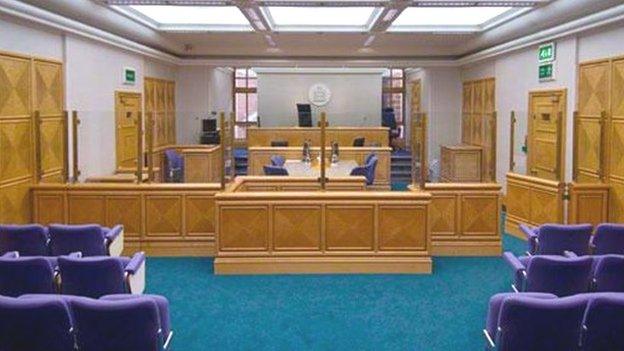Young offender backgrounds to be considered by judges
- Published

Judges should consider whether a young criminal has suffered discrimination as an ethnic minority before deciding their sentence, under a new guideline.
The Sentencing Council for England and Wales says offending may be partly a product of discrimination and "negative experiences of authority".
It is the first guideline to stress discrimination as a youth crime factor.
Official statistics show that young people from minority backgrounds are over-represented in the justice system.
While national statistics show that ethnic minorities account for approximately 14% of the UK's population, the Youth Justice Board says a quarter of all young people arrested , externalin the year to March 2016 were from these backgrounds - some 21,900 people.
The overall number of young offenders cautioned or convicted has been declining, but the rate of decrease has been slower for minority offenders.
'Underlying factors'
In the new guideline - which applies to all offenders aged between 10 and 17 - the council says that any sentence must aim to prevent them from committing another crime, while also taking into account the child's welfare.
"While the seriousness of the offence will be the starting point, the approach to sentencing should be individualistic and focused on the child or young person," states the guideline, which comes into force in June.
It stresses that sentencing judges and magistrates should take into account underlying factors, including the over-representation of black and minority ethnic children in the justice system.
"The factors contributing to this are complex," it says.
"One factor is that a significant proportion of looked-after children and young people are from a black and minority ethnic background.
"A further factor may be the experience of such children and young people in terms of discrimination and negative experiences of authority.
"When having regard to the welfare of the child or young person to be sentenced, the particular factors which arise in the case of black and minority ethnic children and young people need to be taken into account."
'Reintegrate don't alienate'
The guidelines go on to tell judges and magistrates to take into account a youth's mental and educational development, emotional volatility and whether they were from a poor background or grew up around other offenders.
Evidence of abuse or neglect and peer pressure may have also played a role in criminality, they say.
Sentencing Council chairman Lord Justice Treacy - the judge who oversaw the trial of the racist killers of teenager Stephen Lawrence - said the guideline had prevention of reoffending at its heart.
"No-one wants children who commit offences going on to become adult criminals," he said.
"The guideline therefore looks with far greater detail at what kind of sentence would prevent this based on the age, background and circumstances of each child or young person, so that it can help them reintegrate instead of becoming alienated further."

Have you been affected? Tell us your experiences by emailing haveyoursay@bbc.co.uk, external
And share your pictures and video with us at yourpics@bbc.co.uk, external
You can also contact us in the following ways:
Tweet: @BBC_HaveYourSay, external
WhatsApp: +447555 173285
Text an SMS or MMS to 61124 (UK) or +44 7624 800 100 (international)
- Published24 January 2017

- Published12 May 2016

- Published6 October 2016
